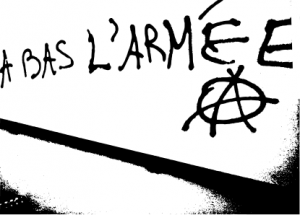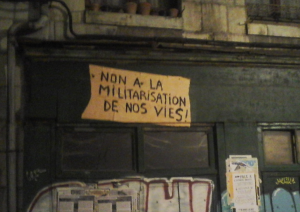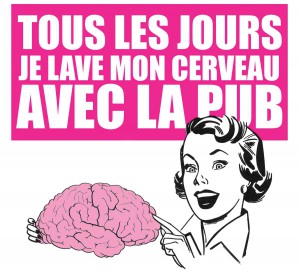A summer of revolts
While the end of last year was marked by social problems that caused a bit of trouble for the powerful, the summer of 2016 brought fiery revolts against this world of misery and oppression. First and foremost, these took aim at those who most obviously carry of the violence of the powerful, namely the cops and the gendarmes [military-style police].
While some go off on vacation, others stay trapped in the prison world of the ghettos. On Tuesday July 19 in Beaumont-sur-Oise in Val-d’Oise, Adama Traore was killed by gendarmes while being arrested. To conceal his death by suffocation at the hands of the pigs, the state immediately began talking about “heart troubles … respiratory troubles … pulmonary infections” and so on. Every time some dies in custody, power puts on the same grim spectacle, with the complicity of the media. This time, Beaumont and Persan [two towns in Val-d’Oise] responded with several nights of revolt, during which many municipal and state buildings (police stations, libraries, garages for city vehicles) as well as capitalist infrastructure (gas stations, supermarkets…) went up in smoke or had their windows smashed.
These attacks against the institutions and infrastructure of this society are the proof that only by destroying this world will we find justice within it. To demand that “justice be done” is to insist that the state condemn a killer in uniform who is himself tasked with maintaining order, so basically asking power to condemn itself. It’s hoping for a kind of state justice that is and always has been in the service of the rich and powerful. Even if this murdering officer were to be found guilty of voluntary homicide, the exploitation and oppression imposed by this system would continue just the same.
In Besançon, in the night of the 14-15th of August, a revolt exploded against some oppressors: the transit security, more and more numerous lately on the tramways at the end of the day (especially in working-class areas). That night, they finally reaped some of the rage they’d been sowing by constantly hassling broke people without transit tickets. One of the lawmen from Besançon Transit will remember this night for a long time, since a paving stone made it through his windshield and took him out of commission for a few weeks. Many buses and trams were pelted with rocks, lots of street fixtures were damaged, and burning barricades on the tracks forced the transit company Ginko to stop traffic until 10am the next day. The cops, always there to defend an order based on money and goods, also felt the rage of the rebels through a hail of stones. And to top off this fine night, no one was arrested.
Each day the state brings forward disgusting laws
from the “work!” law to “manadatory civilian service”
The four months of fierce struggle against the labour law undermined the legitimacy of society and its armed goons, which made power decide to take revenge against the rebels, as the statistics of repression makes clear (according to official statements from the ministry of justice published on July 7 2016, 896 people were arrested and detained and 32 received jail sentences since the beginning of the movement. Out of those held by police, 520 concerned “attacks against law enforcement”, 188 “participation in an armed group”, and 89 for “property destruction”). There were blockades of highschools and universities, economic disruptions targeting its choke points, and sabotage and destruction against everything that perpetuates exploitation and oppression.
Surely we should not turn back from such a promising path (towards insurrection). And there are many reasons to wander further down these seldom-traveled trails, because each day power restructures itself and strengthens its position with laws each more repulsive than the last.
Mandatory military service hasn’t existed for a long time, but the state is planning a modern version, better adapted to the needs of the market, beginning in 2016-2017. The government plans on forcing each youth, after their 18th birthday, to spend all summer working in a business, a stupid community organization, or an institution considered to be “of public utility” (like the army, the gendarmes, the police, the national school system, etc). This new national service will then require six additional months of internship before the age of 25 (completed either all at once or in two blocks of three months). It’s a dream come true for bosses and for the state, who will just sprinkle a few crumbs for the exploited (400 or 600 bucks) once they’re done their task. Welcome to the world of adults, where we’re taught to hustle all day for a bit of pocket money, to put up with shitty labour conditions and the whims of bosses and their cronies, with schedules and rhythms that kill our minds and drain our energy and autonomy. From the age of 18, they need to be trained to be good little minions of the owning class. Beyond just rotting young minds with the habit of exploitation and competition, the idea is to prepare and train each youth to be the ideal citizen, as dreamed of by the state, by force-feeding them patriotism and respect for laws, as well as setting them up to be snitches and sheep…
As for us, will we succeed in breaking through the impasse of resignation to take our lives in our hands, to generalize rebellion against the ever-shittier future proposed by the powerful?
[From Seditions: an irregular anarchist journal the Besançon area. Issue 8, September 2016.]
[Translated by Bordered by Silence]

 The 7th and 8th October, the municipality [of Besançon] had planned to make way for the military so it can show off its potency and seduce the public. The army, this school of submission, authority and crime takes root in every aspect of our everyday life: television and radio commercials, advertising campaigns ubiquitous in the urban space, recruitment banners on many buildings, propaganda articles in the press, regional as well as national, up to being present on paper bags for baguettes.
The 7th and 8th October, the municipality [of Besançon] had planned to make way for the military so it can show off its potency and seduce the public. The army, this school of submission, authority and crime takes root in every aspect of our everyday life: television and radio commercials, advertising campaigns ubiquitous in the urban space, recruitment banners on many buildings, propaganda articles in the press, regional as well as national, up to being present on paper bags for baguettes. Each year, the states hold military parades and ceremonies to commemorate their past bloody wars while endorsing those in progress and paving the way for those to come. These regular ceremonies, serving the state to reaffirm its strength and the poison of national unity, are all opportunities open to us to demonstrate our refusal of their wars, whether conducted on the outside for the economic interests of States, against immigration or to maintain social peace within the borders…
Each year, the states hold military parades and ceremonies to commemorate their past bloody wars while endorsing those in progress and paving the way for those to come. These regular ceremonies, serving the state to reaffirm its strength and the poison of national unity, are all opportunities open to us to demonstrate our refusal of their wars, whether conducted on the outside for the economic interests of States, against immigration or to maintain social peace within the borders… The industrial group JCDecaux is known above all for having enriched itself from advertising from the middle of the 1950s onwards and then by extending its scope of activities in several aspects of the workings of capitalist and state domination.
The industrial group JCDecaux is known above all for having enriched itself from advertising from the middle of the 1950s onwards and then by extending its scope of activities in several aspects of the workings of capitalist and state domination.